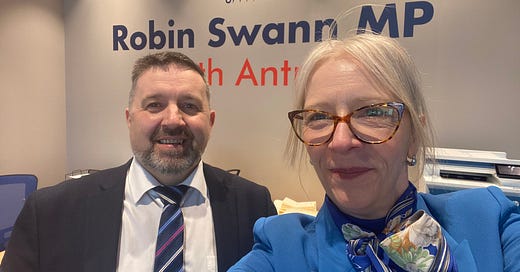Who to Influence — And When: MLAs, MPs, Councillors & Beyond
Understanding power, timing, and strategy in Northern Ireland’s political landscape
One of the most common challenges organisations face when trying to influence policy is knowing who to engage — and when.
It’s easy to default to contacting everyone — your MLA, MP, and local councillor — but in practice, influence works best when it’s targeted, strategic, and aligned with decision-making processes.
This guide outlines the roles of key political and policy actors in Northern Ireland, and how to align your advocacy with the stage of the policy cycle.
Councillors
Scope of influence: Local services, community planning, regeneration, and some public health initiatives.
Best for:
Local support and visibility
Mobilising grassroots political interest
Influencing motions or statements at council level
While councillors cannot legislate, they are valuable allies in building public and political momentum — particularly for community-based campaigns.
MLAs
Scope of influence: Devolved policy areas — including health, education, justice, environment, and infrastructure.
Best for:
Influencing legislation and policy at Stormont
Engaging with Assembly committees
Shaping Executive priorities
MLAs are often the primary target for organisations seeking systemic change within devolved areas. Understanding which committees they sit on, or whether they hold party spokesperson roles, will strengthen your engagement.
MPs
Scope of influence: Reserved matters such as immigration, social security, and most tax powers.
Best for:
Campaigns focused on UK-wide legislation or budget decisions
Influencing party policy at Westminster level
Raising awareness nationally
While MPs from Northern Ireland do not vote on devolved issues at Westminster, they can play a crucial role in advocating on reserved matters or raising an issue's profile beyond the region.
Special Advisers and Civil Servants
Scope of influence: Policy design, decision-making advice, agenda-setting
Best for:
Early-stage engagement
Securing Ministerial support through internal briefings
Building technical understanding of an issue
These behind-the-scenes actors often shape the recommendations that Ministers receive. Establishing constructive, professional relationships with special advisers and civil servants is often key to long-term success.
Final Reflection
Effective advocacy is not about contacting everyone — it is about influencing the right people at the right time with the right message. Understanding the distinct roles of councillors, MLAs, MPs, special advisers, and civil servants allows organisations to focus their efforts where they will have the greatest impact.
Struggling to Get Policymakers to Listen? Here’s Why (and How to Fix It).
You’ve done the research.
You’ve written the policy brief.
You’ve sent the email… And then? Silence.
📌 No reply.
📌 No action.
📌 No change.
It’s not that policymakers don’t care—it’s that they don’t have time for unclear, unfocused, or overly long messages.
If your policy message isn’t clear, concise, and aligned with their priorities, it will get ignored.
That’s why I’ve created this practical, no-fluff course to show you:
✅ The 3-step formula for a message that gets read—and acted on
✅ How to structure the perfect one-page policy brief
✅ How to frame your ask so it aligns with what policymakers care about
Policymakers will listen—when you know how to make them.
💡 Want a bargain? Get 20% OFF (Use code 20OFF)
🔗 Sign up here.





